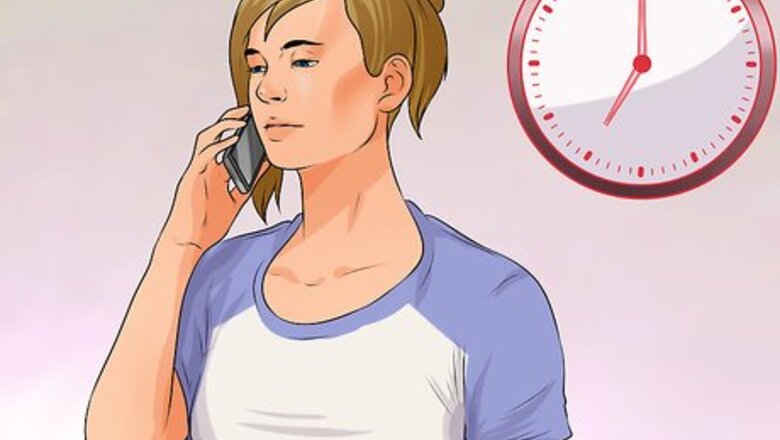
views
Reconnecting with Your Ex
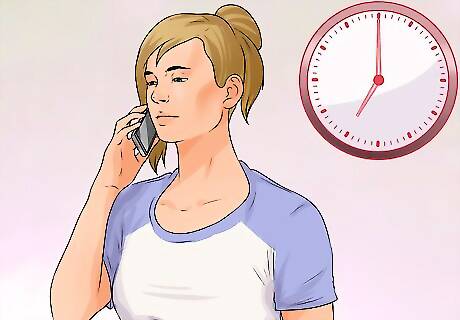
Contact your ex-partner after a period of time. Rather than aggressively call or text your partner several times soon after the break up, take some time to think about the relationship and to recover from any high emotions you may be experiencing. When you feel you might be ready to reach out to your ex-partner, do so with one call or one text. Explain that you hope your ex-partner is well and that you have taken this time apart to work on your issues with the help of a therapist. Avoid acting bitterly towards your ex-partner if they tell you they are seeing someone else and try to respond with generosity. You do not want to be a source of negativity for your ex-partner and you do not want to turn them off in your attempts to reconnect with them.

Begin the dialogue slowly and carefully. Once you make the first contact with your ex-partner, do not try to push the dialogue further or put pressure on your ex-partner to talk to you. Instead, remain casual about keeping the lines of communication open and try to space out your conversations via text message, email, or phone. It may take time for your ex-partner to feel comfortable enough to spend time in person with you or to have longer conversations with you. Be patient and do not bully or nag your ex-partner as you try to re establish a connection with them. Every relationship is unique, so it may take several weeks for you and your ex-partner to reconnect or it may take several months. Gauge your ex-partner's comfort level by gently suggesting meeting up in person for a coffee or a drink after a period of talking back and forth via text, email, or phone. Choose a place that you know will be comfortable for your ex-partner, preferably a public place, and be accommodating to your ex-partner's schedule when choosing the meeting time. It's important that your ex-partner feel that you are willing to meet them on their terms, as this will demonstrate respect and care for their needs.

Look at your ex-partner's body language and tone of voice. As the communication between you and your ex-partner re opens, avoid jumping right into a discussion of whether or not your ex-partner would want to get back together with you. Instead, pay attention to your ex-partner's body language and tone of voice. If they appear distracted, bored, or disinterested, it may be a sign that it is not the time to ask them if they would like to get back together with you. If they make a lot of eye contact with you, appear engaged, and even flirt with you, these are all good signs it may be the right time to broach the subject of getting back together. You should also listen to your ex-partner as they speak as a way to tell if they are interested in getting back together. If they use terms like "we" or "us", they may be open to entering back into the relationship. Your ex-partner may also discuss how they feel, using "I" statements, and be willing to discuss your issues without judgement and with honesty.
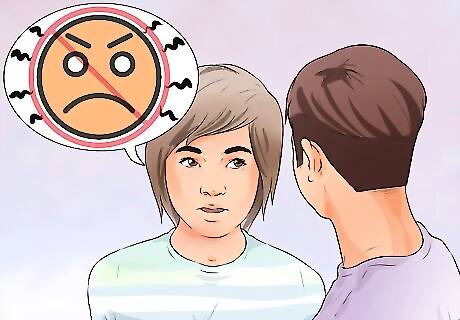
Own up to your issues. If your ex-partner agrees to meet with you in person, you should start the conversation by owning up to your issues. It’s important that you focus on being generous, open, and honest with your ex-partner when you reconnect. You may decide to bring a list of your issues and details on how you are going to work on dealing with them, or you may explain how you have been working on your issues while you and your ex-partner have been apart. During this conversation, try not to criticize your ex-partner. Your focus should be on what you can do to change or shift your old habits so your ex-partner will consider getting back together with you.

Broach the subject of getting back together when you both seem comfortable and open. After spending some time together talking in person, you may feel it is an appropriate time to tell your ex-partner that you would like to renew your romantic relationship. Do so in a direct, clear way and use "I" statements. For example: "Now that we are talking and reconnecting, I feel like I should be honest with you and tell you I would like to get back together." It's important that you follow this statement with a discussion of how you will approach the relationship this time around and how you are willing to shift or change your habits so the relationship is stronger. "I know I made mistakes in the past and I am working on my own issues outside of our relationship. But if you are willing, I would like for us to try to be together again."
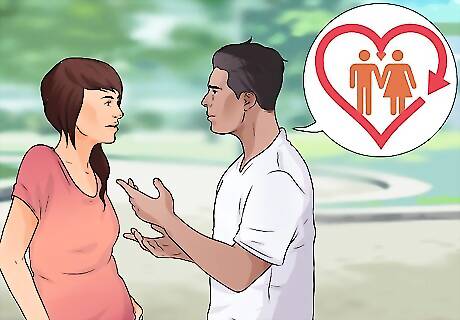
Discuss how you can make your relationship better the second time around. Once you feel you and your ex-partner have a good dialogue going about possibly building a new future together, you should ask your ex-partner what they feel you can do to make the relationship stronger the second time around. Be willing to listen to your ex-partner’s suggestions and discuss possible ways you can both make the relationship more sustainable. You and your ex-partner may decide to go to therapy together to work on your issues with a professional. Often, couples therapy works best if both parties are invested in the future of the relationship and want to try to work on issues together. With some honest conversations, time spent together in therapy, and a commitment to change, you may end up winning back your ex-partner.
Becoming Your Best Self
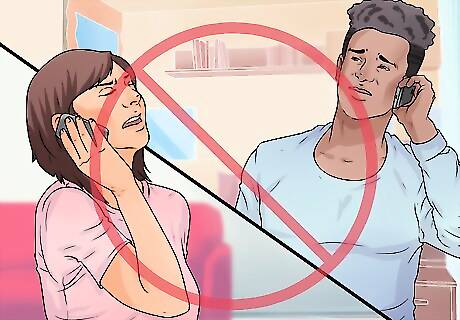
Limit your contact with your ex-partner. Once your partner tells you the relationship is over, avoid begging for another chance or calling your partner over and over again. Take a step back and respect your partner’s desire for space and distance. Use this time apart to focus on your issues and what went wrong in the relationship, rather than try to talk to your partner directly. Limiting your contact may mean avoiding any messaging via text or social media. If you really feel you need more distance and space, you might want to consider unfriending your partner from Facebook and removing their number from your phone. This will prevent you from being tempted to drop in your partner’s life while you are apart and can help you re focus on your issues and needs away from your partner.

Identify the issues that may have lead to the break up. You can do this in an active way by keeping a journal and writing down your thoughts and feelings around the break up. Think about factors that may have lead to the break up, such as infidelity, a lack of trust, or a lack of sexual desire. Make a list of these factors and consider if you are responsible for any of these reasons. This can help you take ownership of the part you played in the break up and help you focus on issues that you may need to work through on your own. In the event your ex-partner does give you a second chance, you want to be sure you can step up and be a good partner. Part of this is acknowledging your shortcomings in the relationship and being willing to work on your shortcomings.

Lean on family and friends. Break ups can be very difficult emotionally and mentally, so it is important that you reach out and lean on your support systems. Contact your family and close friends, and explain the situation to them. Try to find someone close to you that you can talk to and that you know is a good listener. Often, it is helpful to verbalize your feelings of anger, pain, hurt, or shame to a sympathetic listener. Depending on how close you are to your family or your friends, they may have seen you and your ex-partner together or they may have known you both well when you were together. They may be able to give you some insight and perspective on some of the possible issues in your relationship and ways that you can work on these issues. Be willing to listen to their advice, but remember that ultimately you will need to figure out how to work through your issues on your own.
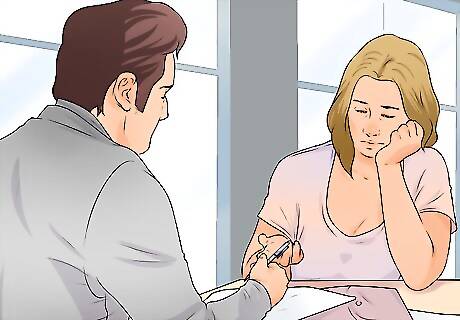
Seek professional support. If you are struggling with the break up with your ex-partner and are not sure how to unpack your issues, you may want to look for a therapist or a counselor you can talk to. A therapist can guide you through any anger, pain, or guilt you are experiencing as a result of the break up and help you work on addressing your personal issues. Working on your issues with a good therapist will also show your ex-partner that you are willing to acknowledge any mistakes you made in the relationship and that you are focusing on cleaning up your act. This is particularly important if the relationship ended due to infidelity, boredom, sexual issues, mental health issues, or even communication issues.


















Comments
0 comment